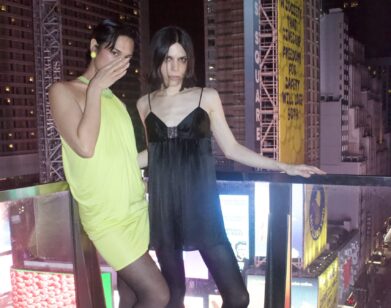Is Rina Sawayama the future of pop?
For Rina Sawayama, the future is now. With her orange hair and penchant for metallic coats, the Japanese-British musician feels ripped from the 1994 film Hackers. Her glistening pop sound summons a boundless virtual utopia. Tracks like “Cyber-Stockholm Syndrome” and “Tunnel Vision” explore the strange feeling of spending half your waking hours in a digital world. Her work as a model gives the visual side of her output a polished editorial quality. Naturally, this extends to her Instagram account. Combined with the complex and excitable production of her musical collaborator, Clarence Clarity, the whole project communicates a highly curated, cutting-edge progressivism.
Sawayama is not an outlier in this sense. Looking at the majority of artistically minded producers and singers in London right now you will see an overriding concern with at least the superficial feel of the hyper-modern. For some of these artists, that superficiality is deliberately cultivated in order to replicate the sheen of corporate branding. When we met up for a chat last month, Rina told me that she thinks the accelerationist mode will date this period more than any other trend. “People’s ideas about the future are so reductive,” she explained, bemoaning the shallow approach many of her contemporaries take. “Like, stop trying to make your vocal production sound computerised or whatever. What about the actual content of your music? How are you addressing any of our actual lived futures?”
Sawayama understands how our literary and cinematic reference points for the distant future have increasingly become normalized by rapidly changing popular culture and technology. On “Cyber Stockholm Syndrome,” she sings, “Used to things feeling so cold, minimizing windows, pictures lit by electric lights, fiction/fact boundaries collide.” Sawayama maintains that, far from futuristic fantasy, android identity and virtual reality are now contemporary themes.
Despite her desire for modern work to address modern problems, Sawayama’s production and melodies often evoke the previous decade. Listening to her new EP Rina, it is hard not to recall the athletic naïveté of early 2000s pop. She is very aware of the effect that her music has on fans who like her grew up on golden era Britney and the Spice Girls. “These melodies have sort of been buried for ten years now,” she notes. She chafes against the label “Future Pop,” which doesn’t chime with her own perception of her work. “People have been calling it that,” she says, “but it’s almost the opposite”.
As the rate of technological development accelerates with every passing month, our social lives change with it. Artists like Rina Sawayama are speeding alongside us to help soundtrack the fascinating, terrifying process.







